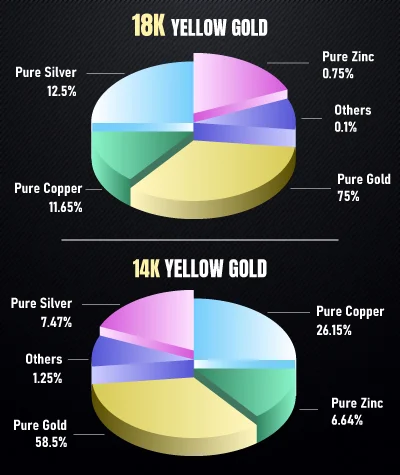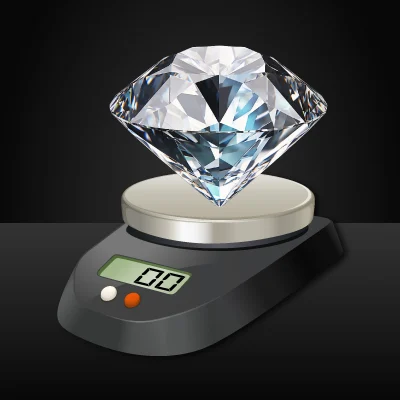
If you have ever gone jewelry shopping, you have undoubtedly encountered the terms "carat" and "karat" at some point. Despite having a similar sound, these are two completely different terms. Beautiful jewelry has a captivating beauty that is frequently difficult to describe. Fortunately, for easier shopping, the qualities of jewelry can be expressed using technical terms, including carat vs karat.
But in reality, "carat" and "karat" refer to two distinct measurement units: "carat" is used to describe precious stones like diamonds. In contrast, "karat" is used to describe how goldsmiths determine the purity of gold. In this article, we'll learn about carats vs karats and how they relate to gold purity and diamond weight.

The term "karat", which is most frequently used to refer to gold, indicates the purity of the metal.
The number of karats is 1–24, with 24 being the purest. Since gold is a softer metal that is easily bent and scratched, it is uncommon to find jewelry made entirely of 24 karat gold. To make gold more resilient and long-lasting to wear, it is frequently combined with other metals like nickel or copper.
A numerical stamp on a piece of jewelry, such as a ring , necklace, earrings , or other piece, indicates how pure the item is. Usually, a number, like 14 or 18, is followed by the letter K. The higher the number, the more gold in each piece.
24k gold jewelry contains 24 of the 24 parts of gold, meaning that gold jewelry is rated out of 24 parts. This is extremely uncommon for jewelry and is regarded as pure gold. In addition, 18 of 24 parts, 14 of 24 parts, 10, and 9 are also standard gold purity levels.
Here's a quick look at what the different karat values mean:

What is carat vs karat? The weight of the gemstones is referred to as carat when discussing diamonds. Scales with specialized calibrations are used to weigh diamonds. Additionally, the price increases with the carat size. Understanding that carat pertains to weight rather than size in diamonds is essential. The dimensions of a diamond are indicated in millimeters. For example, a brilliant-cut diamond weighing one carat has a diameter of 6.5 millimeters.
Furthermore, carat is one of the four Cs that determines diamond quality. Cut, clarity, and color are also included in this. These are the internationally recognized guidelines for determining a diamond's quality.
The ancient Greek word keration, which means "carob seeds", is where the word carat originated. Because carob beans were similar in size and weight, they were used to measure the weight of gold and diamonds. Additionally, pure gold coins were weighed using them.
Most of the diamond buyers get confused between diamond size and carat. Carat is a diamond’s and other gemstone’s weight which was initially obtained from carob seeds by gem merchants in the early times. So, the carat is all about a unit that measures weight, not size! One carat is 0.2 grams, a standard diamond weight unit.
Various shapes and cuts of the diamond can make us visually feel that it is larger or smaller, influencing its brilliance. Yet, it’s the weight that matters. Knowing such particulars of the diamond will help diamond lovers when choosing a perfect diamond for themselves or as a gift. Visual appeal and weight are two main factors deciding on a diamond’s origin, price, and rarity.
In literature pertaining to jewelry, the spellings carat vs karat are frequently used interchangeably. While "karat" can only refer to gold purity, the spelling "carat" can refer to either gold purity or diamond weight. The word "karat" is spelled differently than "carat." Later on, "Karat" was added to differentiate the weight of gemstones from the purity of gold.
What separates carat and karat is their primary point of difference. Whereas karat gauges the fineness of gold, carat gauges the weight of diamonds. A carat is equivalent to 200 milligrams, a unit of measurement for the purity of an alloy made of 24 parts gold.
Spelling preference is somewhat influenced by regional differences. While "karat" is typically used in the US to denote gold purity, "carat" is the default term frequently used in the UK and Australia. However, no matter where you live, "karat" is never used to describe the weight of a diamond.
Understanding carat vs. karat is essential when shopping for jewelry. Though they may seem alike, they actually have distinct meanings. "Carat" measures the weight of gemstones such as diamonds, while "karat" measures the purity of gold.
Understanding these differences is important for making informed choices and understanding the genuine worth of the jewelry you purchase. So, next time you search for a diamond ring or a gold necklace, remember these key differences and choose wisely!
Explore BOLD's wide range of jewelry, offering competitive prices for your next purchase. At BOLD, you can easily distinguish between carat and karat, as we provide a variety of jewelry metals, including gold, silver, platinum, and diamond, all carefully curated for you.